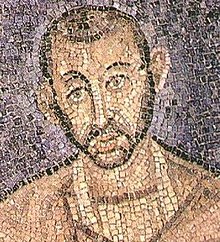
Back Ambrosius von Mailand ALS أمبروز Arabic امبروسيوس ARZ Ambrosiu de Milán AST Müqəddəs Ambrosi AZ Ambrosius vo Mailand BAR Амвросій Медыяланскі BE Амброзій Мэдыяланскі BE-X-OLD Амвросий Медиолански Bulgarian Ambroaz Milano BR
Ambrose of Milan | |
|---|---|
| Bishop of Milan | |
 Detail from possibly contemporary mosaic (c. 380–500) of Ambrose in the Basilica of Sant'Ambrogio[1] | |
| Diocese | Mediolanum (Milan) |
| See | Mediolanum |
| Installed | 374 AD |
| Term ended | 4 April 397 |
| Predecessor | Auxentius |
| Successor | Simplician |
| Orders | |
| Consecration | 7 December 374 |
| Personal details | |
| Born | Aurelius Ambrosius c. 339 |
| Died | 4 April 397 (aged 56–57) Mediolanum, Italia, Roman Empire |
| Buried | Crypt of the Basilica of Sant'Ambrogio |
| Denomination | Christian |
| Sainthood | |
| Feast day | 7 December |
| Venerated in | |
| Title as Saint | Doctor of the Church |
| Patronage | Milan and beekeepers[2]
Other patronage
|
| Shrines | Basilica of Sant'Ambrogio |
Theology career | |
| Notable work |
|
| Theological work | |
| Era | Patristic Age |
| Tradition or movement | Trinitarianism |
| Main interests | Christian ethics and mariology |
| Notable ideas | Anti-paganism, mother of the Church[4] |
Ambrose of Milan (Latin: Aurelius Ambrosius; c. 339 – 4 April 397), venerated as Saint Ambrose,[a] was a theologian and statesman who served as Bishop of Milan from 374 to 397. He expressed himself prominently as a public figure, fiercely promoting Roman Christianity against Arianism and paganism.[5] He left a substantial collection of writings, of which the best known include the ethical commentary De officiis ministrorum (377–391), and the exegetical Exameron (386–390). His preachings, his actions and his literary works, in addition to his innovative musical hymnography, made him one of the most influential ecclesiastical figures of the 4th century.
Ambrose was serving as the Roman governor of Aemilia-Liguria in Milan when he was unexpectedly made Bishop of Milan in 374 by popular acclamation. As bishop, he took a firm position against Arianism and attempted to mediate the conflict between the emperors Theodosius I and Magnus Maximus. Tradition credits Ambrose with developing an antiphonal chant, known as Ambrosian chant, and for composing the "Te Deum" hymn, though modern scholars now reject both of these attributions. Ambrose's authorship on at least four hymns, including the well-known "Veni redemptor gentium", is secure; they form the core of the Ambrosian hymns, which includes others that are sometimes attributed to him. He also had a notable influence on Augustine of Hippo (354–430), whom he helped convert to Christianity.
Western Christianity identified Ambrose as one of its four traditional Doctors of the Church. He is considered a saint by the Catholic Church, Eastern Orthodox Church, Anglican Communion, and various Lutheran denominations, and venerated as the patron saint of Milan and beekeepers.
- ^ "Saint Ambrose, in the Sacello di San Vittore in Ciel d'Oro". Artstor. Retrieved 8 January 2021.
- ^ Brown 2021.
- ^ Guiley 2001, p. 16.
- ^ Sharkey & Weinandy 2009, p. 208.
- ^ McKinnon 2001.
Cite error: There are <ref group=lower-alpha> tags or {{efn}} templates on this page, but the references will not show without a {{reflist|group=lower-alpha}} template or {{notelist}} template (see the help page).